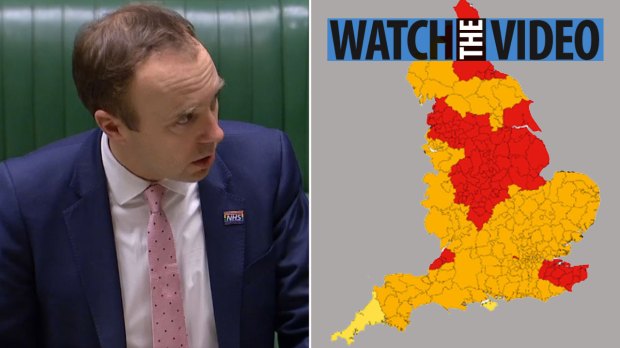Covid tier postcode checker CRASHES just minutes after going live as Brits try to find out their restrictions


THE Government’s Covid tier website CRASHED just minutes after going live.
Brits scrambling to find out restrictions in their local area have been hit by "technical difficulties".
⚠️ Read our coronavirus live blog for the latest news & updates
The is now up and running again, and you can enter your postcode to find out which level of restrictions your area will be under.
London and Liverpool are set to go into Tier 2 and Manchester, Birmingham and Newcastle into Tier 3.
The new toughened up lockdown tiers are due to come into effect next Wednesday, when England's month-long national lockdown ends.
The news comes as:
Health secretary Matt Hancock today told the Commons that more areas in England than before would be in the higher risk tiers in a bid to keep transmission low.
He said: "While all three tiers are less stringent that the national lockdown that we're all living in now, to keep people safe and to keep the gains that are being made, more areas than before will be in the top two tiers."
Mr Hancock added that there will be a review of the latest tiers on December 16.
In Tier 1, the rule of six applies indoors and outdoors, people are urged to work from home if they can and pubs are limited to table service.
Only three rural areas - the Isle of Wight, Cornwall and the Isle of Scilly - are in the lightest Tier 1.
The majority of England will be in Tier 2, in which restrictions ban households mixing indoors and in pubs - while restaurants can only serve booze with a 'substantial meal'.
The newly tougher Tier 3 means pubs, restaurants and cafes have to shut - along with indoor entertainment.
Strict Tier 3 measures ban households from mixing, except in limited circumstances such as parks.
Tories are already rounding on ministers to demand their areas stay out of the top level of restrictions.
They are demanding a cost benefit analysis and reams of data to back up the theory that the stricter rules will help bring down infections.
Responding to the frustration of local communities in the higher tiers, Mr Hancock stressed that only the areas with the very lowest infection rates would see significantly relaxed restrictions.
He said: "The lowest case rates are in Cornwall, the Isle of Wight and the Isles of Scilly which will go into Tier 1.
"In all three areas, they've had very low case rates throughout and I want to thank residents for being so vigilant through the whole pandemic."
He added: "I know that many other areas will want to be in Tier 1, I understand that."
Earlier today, The Sun reported that England's local lockdown tiers could already be outdated as cases are falling.
Professor Carl Heneghan, an epidemiologist at Oxford University, claimed the new tiered system may be "unjustified" based on recent data.
He pointed to recent Government figures, which show new infections halved in a week - from 18,626 last Tuesday to 9,854 seven days later.
If this trend continues, he said that by the time the national lockdown ends next week, the country could be in a similar place to where it was before the second wave in September when there were minimal restrictions.
Meanwhile, Government figures showed a further 696 people had died within 28 days of testing positive for coronavirus as of Wednesday, with the UK total now standing at 56,533.
In Scotland, Nicola Sturgeon has said rules allowing people to meet up at Christmas are likely to be tightened when they are set out on Thursday.
She said: "The expectation should be that the guidance will probably look to tighten around the edges rather than further expand and that will be true with the travel window of opportunity as well - we want to limit that window, not expand it."
The Welsh Cabinet is also expected to meet to decide whether further restrictions similar to the English tier system will be needed before Christmas.
However, a decision is not likely to be announced until Friday.
In Northern Ireland, tougher lockdown restrictions will be introduced from Friday, with pubs, restaurants, non-essential retail and close contact services to close for a fortnight.